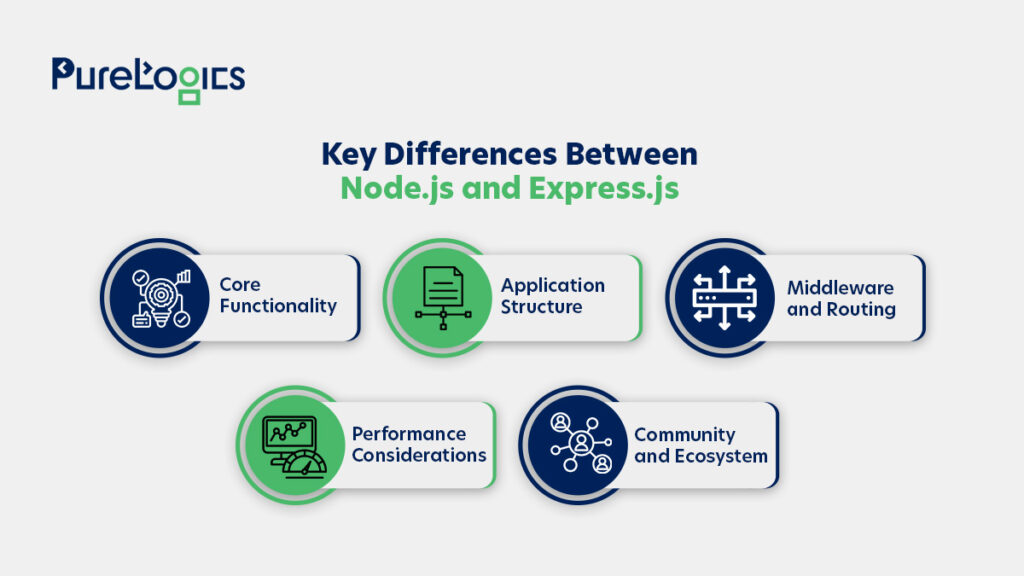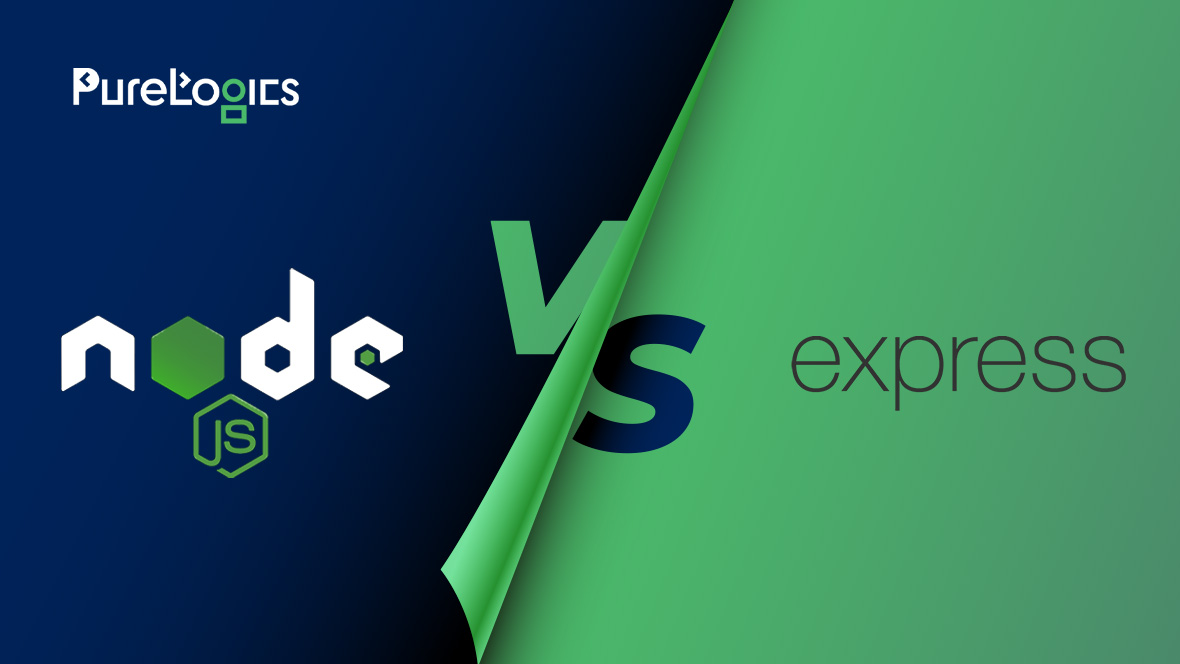In backend development, Node.js and Express.js frequently come up—but what exactly sets them apart? Node.js brings JavaScript to the server, while Express.js simplifies routing and middleware handling. Whether you’re building APIs, web apps, or real-time services, you must know when to use each.
This blog post will walk you through their core differences, features, and ideal use cases, helping you make the right choice for your project.
What is Node.js?
Node.js is an open-source runtime environment that enables JavaScript to run on the server side. Known for its non-blocking, event-driven architecture, it excels in handling real-time applications, APIs, and microservices.
Many top companies, including Netflix, LinkedIn, and PayPal, use Node.js for its speed and scalability. Whether building chat apps, streaming services, or backend systems, Node.js offers a powerful solution for modern web development.
Here are the key features of Node.js:
Asynchronous & non-blocking: Handles multiple requests simultaneously for high performance.
Event-driven architecture: Efficiently manages real-time applications like chats and streaming.
Single programming language: Uses JavaScript for both frontend and backend.
Fast execution: Powered by the V8 engine for quick processing.
Scalability: Ideal for microservices and large-scale applications.
Cross-platform: Runs on Windows, macOS, and Linux.
Use Cases of Node.js
Now, let’s explore the top use cases of Node.js!
Real-Time Chat Applications
Node.js, with WebSockets, enables bidirectional communication between users, making it ideal for chat applications like WhatsApp Web and Slack. It ensures smooth real-time messaging with minimal latency.
Streaming Services
Node.js handles large-scale data streaming efficiently, which is why platforms like Netflix and YouTube use it to buffer and deliver high-quality content without delays. Its non-blocking architecture ensures seamless video playback.
Microservices Architecture
Node.js is widely used for breaking down monolithic applications into smaller, independent microservices, allowing businesses to scale efficiently. Companies like PayPal leverage Node.js to handle millions of transactions via microservices.
IoT Applications
Due to its event-driven nature, Node.js is ideal for handling continuous data streams from IoT devices. It processes sensor data in smart home systems, industrial automation, and real-time health monitoring.
Single-Page Applications (SPAs)
Node.js helps build fast and interactive SPAs like Gmail and Trello by efficiently handling asynchronous calls. It ensures a smooth user experience by dynamically updating content without reloading the page.
Server-Side Rendering (SSR)
Node.js enhances SEO and performance in applications like e-commerce platforms by rendering pages on the server before sending them to the client. This reduces load time and improves search engine rankings.
RESTful and GraphQL APIs
Node.js is a popular choice for building lightweight and high-performance APIs. Companies like Twitter use Node.js to power fast and scalable APIs that handle millions of requests per second.
What is Express.js?
Express.js, commonly known as Express, is a lightweight and flexible web application framework that enhances the capabilities of Node.js. It simplifies backend development by offering built-in features for routing, handling HTTP requests, and integrating with databases.
Ideal for building web servers, RESTful APIs, and mobile applications, Express.js is widely used by companies like Uber, IBM, and Accenture for its efficiency and scalability. By streamlining complex tasks, Express.js allows developers to create high-performance applications with minimal effort.
Here are the top features of Express.js:
Fast and lightweight: Minimalist framework that enhances Node.js without unnecessary overhead.
Robust routing: Provides a simple yet powerful routing system to manage different URL endpoints.
Middleware support: Allows easy integration of middleware for handling requests, authentication, logging, and more.
Template engine support: Works with templating engines like EJS, Pug, and Handlebars for dynamic content.
RESTful API development: Simplifies the creation of RESTful APIs for web and mobile applications.
Database integration: Supports databases like MongoDB, MySQL, and PostgreSQL.
Error handling: Built-in error-handling mechanisms for smooth application performance.
Flexible and scalable: Easily adaptable for small projects or large-scale enterprise applications.
Use Cases of Express.js
Here are the popular use cases of express.js!
Building RESTful APIs
Express.js provides a simple and flexible way to create RESTful APIs for web and mobile apps. Companies like Meta use Express.js to develop fast, scalable APIs that serve millions of users daily.
Web Application Development
Express.js powers web applications for companies like Uber and Airbnb by providing a structured framework. It simplifies routing, request handling, and middleware integration for high-performance apps.
E-commerce Platforms
Express.js helps develop scalable e-commerce sites like Shopify by managing product catalogs, transactions, and order processing. It ensures smooth integration with payment gateways and inventory systems.
Backend for Mobile Applications
Express.js is widely used as a backend for mobile applications, enabling efficient data handling and authentication. Apps like Instagram rely on Express.js for managing user interactions and notifications.
Middleware Management
Express.js allows seamless integration of middleware for logging, authentication, and error handling. This makes it ideal for applications that require session tracking, such as banking platforms.
Content Management Systems (CMS)
Express.js powers CMS platforms like Ghost and KeystoneJS, allowing users to manage digital content efficiently. It ensures smooth content creation, publishing, and distribution.
User Authentication Systems
Express.js simplifies user authentication with JWT, OAuth, and Passport.js. It helps businesses like Google secure their applications by managing user login sessions and role-based access control.
Key Differences Between Node.js and Express.js

When delving into backend development with JavaScript, understanding the distinctions between Node.js and Express.js is crucial. While they are interconnected, each serves unique roles in the development ecosystem. Let’s explore their key differences in detail.
Core Functionality
Node.js: At its core, Node.js is a runtime environment that allows developers to execute JavaScript on the server side. Built on Chrome’s V8 JavaScript engine, it provides a platform for building fast and scalable network applications. Node.js offers modules for handling file systems, streams, and networking, but it doesn’t prescribe any specific structure for applications.
Express.js: Express.js is a web application framework built on top of Node.js. It abstracts the complexities of Node.js by providing a robust set of features to develop web and mobile applications. Express.js simplifies tasks such as routing, middleware integration, and handling HTTP requests, offering a more streamlined approach to building applications.
Application Structure and Setup
Node.js: When working solely with Node.js, developers have the flexibility to structure their applications as they see fit. This freedom, while powerful, can lead to increased setup and configuration time, especially for larger applications. Developers need to manually handle routing, middleware, and other aspects, which can become complex.
Express.js: Express.js provides a more organized structure out of the box. It offers a straightforward setup with predefined patterns, reducing the boilerplate code. This structure allows developers to focus on building features rather than configuring the application, leading to faster development times.
Middleware and Routing
Node.js: In Node.js, handling middleware and routing requires manual implementation. Developers need to write custom code to manage the flow of requests and responses, which can be time-consuming and error-prone.
Express.js: Express.js introduces a powerful middleware system that allows developers to execute functions during the request-response cycle. It also provides a robust routing mechanism to define application endpoints, making it easier to manage different routes and HTTP methods.
Performance Considerations
Node.js: Node.js is known for its non-blocking, event-driven architecture, which allows it to handle multiple connections efficiently. This design makes it suitable for applications that require high concurrency and real-time interactions.
Express.js: While Express.js builds upon Node.js, it introduces additional layers of abstraction, which can lead to slight performance overhead. However, this overhead is often negligible compared to the development efficiency and scalability gains it provides.
Community and Ecosystem
Node.js: Being a runtime environment, Node.js has a vast ecosystem of modules and packages available through npm (Node Package Manager). This extensive library allows developers to find and integrate various functionalities into their applications.
Express.js: As a framework built on Node.js, Express.js benefits from the same npm ecosystem. Additionally, it has its own set of middleware and plugins developed by the community, further extending its capabilities.
Node.js vs Express.js: A Quick Recap
| Feature | Node.js | Express.js |
| Core Functionality | A runtime environment that enables JavaScript on the server side | A web framework built on Node.js for easier development |
| Usage | Used for building scalable network applications | Used for developing web applications and APIs |
| Built-in Features | Comes with modules for file system, HTTP, and streams | Provides middleware, routing, and templating support |
| Routing | Requires custom implementation for handling routes | Offers a built-in, easy-to-use routing system |
| Middleware | No built-in middleware support; developers must manually integrate | Supports middleware functions for request handling |
| Setup Complexity | Requires more setup and configuration for web development | Simplifies development with a structured approach |
| Performance | Fast due to its event-driven, non-blocking nature | Slight overhead due to additional abstraction layers |
| Flexibility | Provides flexibility in application structuring | Offers a structured approach with predefined patterns |
| Community & Ecosystem | A large ecosystem with npm packages for various functionalities | Benefits from Node.js’s ecosystem plus its own middleware support |
Choose Node.js If
- You are planning to build a streaming web application that requires efficient data handling and fast content delivery.
- You want to create or strengthen a real-time multi-user Node.js web application, such as a chat platform or collaborative tool.
- You need a lightweight and scalable backend solution for handling high traffic and concurrent requests.
- You are developing a microservices-based architecture to improve scalability and maintainability.
- You require a single programming language (JavaScript) for both frontend and backend to streamline development.
Choose Express.js If
- You need a minimal and efficient web framework that speeds up development with less boilerplate code.
- You want to build a scalable RESTful API that can handle thousands of requests per second.
- You are developing a web application that requires flexible middleware integration for authentication, logging, or error handling.
- You want to create a backend that seamlessly connects with databases like MongoDB, MySQL, or PostgreSQL.
- You need a fast and lightweight solution to develop single-page applications (SPAs) or server-side rendered (SSR) applications.
Final Remarks
Choosing between Node.js and Express.js depends on your project’s needs. If you’re looking for a powerful runtime to execute JavaScript on the server side, Node.js is your go-to solution. On the other hand, if you want a lightweight, structured framework to simplify web development, Express.js is the right choice. Both technologies work hand in hand to build fast, scalable, and efficient web applications.
Whether you’re developing a RESTful API, a real-time application, or an enterprise-grade platform, making the right choice can significantly impact your development speed and performance. Need expert guidance? Our team specializes in building high-performance web applications using Node.js and Express.js.
Book your free 30-minute consultation today to turn your vision into reality!


 [tta_listen_btn]
[tta_listen_btn]
 April 21 2025
April 21 2025






